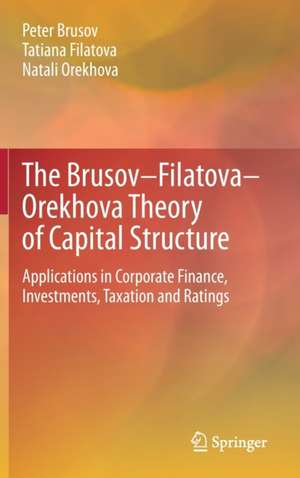The Brusov–Filatova–Orekhova Theory of Capital Structure: Applications in Corporate Finance, Investments, Taxation and Ratings
Autor Peter Brusov, Tatiana Filatova, Natali Orekhovaen Limba Engleză Hardback – 18 mai 2023
| Toate formatele și edițiile | Preț | Express |
|---|---|---|
| Paperback (1) | 822.96 lei 38-44 zile | |
| Springer International Publishing – 18 mai 2024 | 822.96 lei 38-44 zile | |
| Hardback (1) | 974.98 lei 6-8 săpt. | |
| Springer International Publishing – 18 mai 2023 | 974.98 lei 6-8 săpt. |
Preț: 974.98 lei
Preț vechi: 1189.00 lei
-18% Nou
Puncte Express: 1462
Preț estimativ în valută:
186.56€ • 203.29$ • 157.21£
186.56€ • 203.29$ • 157.21£
Carte tipărită la comandă
Livrare economică 23 aprilie-07 mai
Preluare comenzi: 021 569.72.76
Specificații
ISBN-13: 9783031279287
ISBN-10: 303127928X
Pagini: 769
Ilustrații: XXXI, 769 p. 421 illus., 98 illus. in color.
Dimensiuni: 155 x 235 mm
Greutate: 1.29 kg
Ediția:2023
Editura: Springer International Publishing
Colecția Springer
Locul publicării:Cham, Switzerland
ISBN-10: 303127928X
Pagini: 769
Ilustrații: XXXI, 769 p. 421 illus., 98 illus. in color.
Dimensiuni: 155 x 235 mm
Greutate: 1.29 kg
Ediția:2023
Editura: Springer International Publishing
Colecția Springer
Locul publicării:Cham, Switzerland
Cuprins
Introduction.- Capital Structure Theory: Past, Present, Future.- Main Theories of Capital Structure.- Modern theory of capital cost and capital structure - Brusov-Filatova-Orekhova theory (BFO theory).- Bankruptcy of the famous trade off theory.- New mechanism of formation of the company optimal capital structure, different from suggested by trade off theory.- The global causes of the global financial crisis.- The role of taxing and leverage in evaluation of capital cost and capitalization of the company.- A qualitatively new effect in corporate finance: abnormal dependence of equity cost of company on leverage.- Inflation in Brusov–Filatova–Orekhova theory and in its perpetuity limit – Modigliani – Miller theory.- Benefits of Advance Payments of Tax on Profit: Consideration within Brusov–Filatova–Orekhova (BFO) Theory.- The Generalization of the Brusov–Filatova–Orekhova Theory for the Case of Payments of Tax on Profit with Arbitrary Frequency.- Influence of Method and Frequencyof Profit Tax Payments on Company Financial Indicators.- Generalization of the Brusov–Filatova–Orekhova Theory for the Case of Variable Income.- BFO Theory with Variable Profit in Case of Advance Payments of Tax on Profit.- BFO Theory with Variable Profit: Two Types of Payments of Tax on Profit: Advanced Payments and at the Ends of Periods.- Investment models with debt repayment at the end of the project and their application.- Investment Models with Uniform Debt Repayment and Their Application.- The analysis of the exploration of efficiency of investment projects of arbitrary duration (within Brusov–Filatova–Orekhova theory).- Whether it is possible to increase taxing and conserve a good investment climate in the country?.- Whether it is possible to increase of the investment effi-ciency, increasing tax on profit rate?.- Optimizing the Investment Structure of the Telecommunication Sector Company.- Innovative Investment Models with Frequent Payments of Tax on Income and of Interest on Debt.- The Role of the Central Bank and Commercial Banks in Creating and Maintaining of a Favorable Investment Climate in the Country.- The Golden Age of the Company (Three Colors of Company’s Time).- A "golden age" of the companies: Conditions of its existence.- New meaningful effects in modern capital structure theory.- Rating: New Approach.- Rating methodology: new look and new horizons.- Application of the Modigliani–Miller Theory, Modified For the Case of Advance Payments of Tax on Profit, in Rating Methodologies.- Ratings of the Investment Projects of Arbitrary Durations: New Methodology.- Ratings of Investment Projects of Arbitrary Duration with a Uniform Debt Repayment: a new approach.- Conclusions
Notă biografică
Peter Brusov is professor at the Financial University under the Government of the Russian Federation in Moscow (Russia). He has been a visiting Professor of Northwestern University (USA), Cornell University (USA), Osaka City University (Japan) and National Chung Cheng University (Taiwan) among other places. He is the author of over 500 research publications including six monographs, numerous textbooks and articles.
Tatiana Filatova is professor at the Financial University under the Government of the Russian Federation in Moscow (Russia). In the past 20 years, she has been Dean of the faculties of financial management, management, state and municipal government at the Financial University. Tatiana Filatova is the author of over 250 research publications including five monographs, numerous textbooks and articles.
Natali Orekhova is professor at the Southern Federal University in Rostov-on-Don (Russia). She has been a leading scientist of the Financial University under the Government of the Russian Federation. She is the author of over 120 research publications including five monographs, numerous textbooks and articles.
Natali Orekhova is professor at the Southern Federal University in Rostov-on-Don (Russia). She has been a leading scientist of the Financial University under the Government of the Russian Federation. She is the author of over 120 research publications including five monographs, numerous textbooks and articles.
Textul de pe ultima copertă
The book introduces and discusses the modern theory of the cost of capital and capital structure - the BFO theory (Brusov-Filatova-Orekhova theory), which is valid for companies of arbitrary age and which replaced the theory of Nobel laureates Modigliani and Miller. The theory takes into account the conditions faced by companies operating in the real economy, such as revenue fluctuations; the arbitrary frequency of tax on profit payments (monthly, quarterly, semi-annual or annual payments), both for advance income tax payments and for payments at the end of the respective period; and the arbitrary frequency of interest on loans payments. The impact of these conditions on the company value, on the cost of raising capital, on the company's dividend policy and managerial decisions are discussed. The book subsequently develops new applications of the BFO theory in several areas such as corporate finance, corporate governance, investments, taxation, business valuations and ratings.
Caracteristici
Introduces the Brusov-Filatova-Orekhova (BFO) theory of capital cost and capital structure Discusses the model’s applications in various financial areas Helps to increase the accuracy of business valuations
